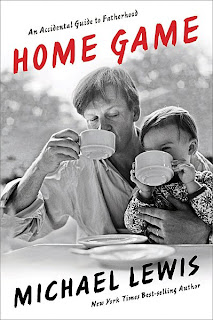 Every man is an expert in his own life, which can cause trouble when he writes about things he shares with millions of other men -- he can find that his experiences aren't as universal as he thought, or that what he has to say about them isn't as profound as he hoped.
Every man is an expert in his own life, which can cause trouble when he writes about things he shares with millions of other men -- he can find that his experiences aren't as universal as he thought, or that what he has to say about them isn't as profound as he hoped.I've only previously read Michael Lewis when he was writing about financial topics, and there he has a massive lead on me, and on most of us, in knowledge and expertise. Home Game, though, is a memoir of parenting (lightly adapted from a series of columns he wrote for Slate), which means Lewis is opening himself up to the Monday-morning quarterbacking of nearly every reader. And though Lewis's voice is as casually authoritative as ever, when the reader can check it against his own life, it holds substantially less real authority.
For example, he protests far too much, both about the fact that men of his generation (meaning him) are expected to actually do some of the caring for their spawn, and about how very, very hard he and his wife have it, with the children waking up at night, and making it hard to work, and so forth. For the latter, I should mention that we're talking about Lewis, at least comfortably well off as a writer of books, and who works at home on his own schedule, and his wife Tabitha Soren, who seems to have retired from her original career of being the smart, grounded person on MTV to be a full-time wife and mother, who at the beginning of the book jetted off with their then-only child to live for a few months in Paris for no particular reason.
Lewis does wring some humor out of the standard set-pieces of the daddy memoir, but he also mentions off-handedly that he and his wife got full-time help with the kids at some point, which rather diminishes his achievements in the eyes of readers who may have worked one (or two, or three) jobs outside the home without the benefit of even one full-time person in the home.
Home Game also focuses mostly on Lewis's kids -- Quinn, Dixie, and Walker -- at their least distinctive, when they're infants. (And, even then, Lewis is more interested in his own reactions to them than to the things that they're actually doing and learning -- this memoir is firmly locked up inside Michael Lewis's skull throughout.) Lewis does tell entertaining stories, and his voice is as engaging and smooth as ever, but Home Game feels even slimmer than its 190 pages.
Home Game is one of those short, inoffensive books published every June, presumably for children who don't really know their father's tastes but still want to give him something for Father's Day. It doesn't bear much sign of having been rethought or expanded substantially from those old Slate columns; it's really a series of short essays on being *M*i*c*h*a*e*l* *L*e*w*i*s* and learning to cope with a succession of babies. Its applicability to those of us who are not Michael Lewis will be slight, but it is often funny, and your father will make a pleased noise if you give it to him a week from Sunday. But, if you really love the old man, try to get him a better Michael Lewis book -- preferably one he hasn't already read.
No comments:
Post a Comment